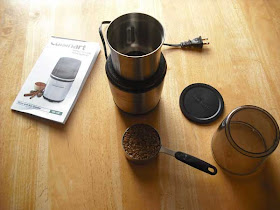Rye Chop Bread and Cracked Wheat Bread
Recently I obtained an electric spice grinder. The box said that it could grind spelt, so I felt that it might be also appropriate to grind (small) quantities of rye kernels or hard wheat berries. Adding cracked wheat to breads and sourdough rye chops can really lend a bread a lot of flavour. And I was curious to see how the tiny machine would fare when grinding these hard kernels all the way into fine flour.
The first Cuisinart grinder I got had to be returned. It simply did not work at all. The second one seems to work okay -- although I wouldn't dare try to grind more than 1/4 cup of hard kernels at a time. It doesn't really take all that long to grind that much -- about a minute and a half, depending on how fine you want to chop it up -- but I think that much more volume than the 1/4 cup would really tax the tiny high-speed engine.
I have a couple of old hand-grinders (originally coffee grinders) that do a much better job grinding grain kernels, but they do require some extra time and muscle power, and I find them a bit awkward to use. It is difficult to support the base and crank them at the same time. I have heard that the excess speed that these electric grinders use will have a negative effect on the kernel's oils. Could be: I don't know. But I do know that when you take the lid off, there is a lot of very fine dust floating around inside the unit. The scent is faintly electrical, faintly oily. Has some of the protein been denatured in the high speed crushing?
I trialled a couple of different sourdough loaves:
(1) A 100% rye bread with 1/2 cup of rye chops that had been sitting in sourdough all night ...
2) A 100% whole wheat bread with 1/2 cup cracked wheat that had been sitting in sourdough all night.
 |
| Overproofed and baked in a too cold oven: no rise. "Arggh. Who turned off the oven?!" |
The loaves were overproofed, because we went out visiting and didn't get back for several hours (about 4 hours after I would have baked them, had I been home). This actually benefited the rye loaves, and I count them among the very best rye loaves I've ever baked. Unfortunately, the whole wheat loaves suffered badly. They may have been all right, but I was trying to fit the baking cycle in between my wife's use of the oven for dinner, and she inadvertently turned off the oven in mid baking of my loaves, thinking she had left it on. Arggh.
 |
| The Rye Loaves plumped up extra big after an extra 4 hours of proofing |
Pizza Finale
We didn't get home soon enough for me to make it, so I refrigerated the pizza dough I had been putting together, the same time as the above loaves. The next day I made some sourdough pizza, and I wasn't impressed.
I only used about 1/3 of the pizza dough, and later on I made a couple of smaller breads from that same batch, rather than repeat the awful pizza.
Those loaves contained all purpose flour, so I didn't want to eat them. Blecch. My wife gave one away. I think the chickens got the other one. I don't think I even took a picture of them.
Notes to Myself
- A much longer proofing of rye dough can actually benefit it. Try it again, leaving the dough in the tins for as much as 12 hours, to see if you can repeat this serendipitous loaf.
- Remind wife not to turn off oven when you are baking.
- What else can you grind up with this little spice blender? Hey: why not try spices?














No comments:
Post a Comment